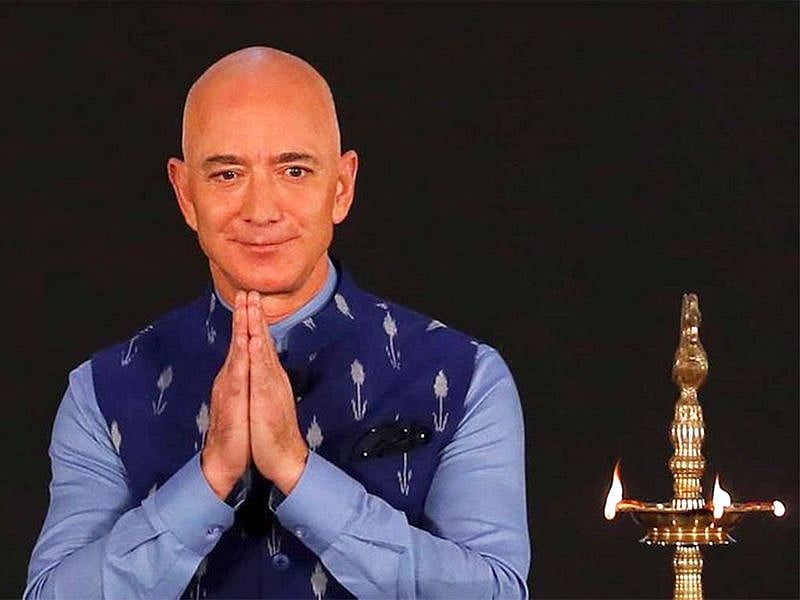Amazon's Jeff Bezos just got $10 billion richer, thanks to deal with OpenAI
$38b cloud computing deal with OpenAI raises Amazon founder's worth by $10b in on day

A surge in Amazon's stock price on Monday, propelled by the announcement of a $38 billion cloud computing deal with OpenAI, raised Amazon founder Jeff Bezos’ estimated net worth up by approximately $24 billion in a single day.
It’s his largest one-day gain since April — building on the $24 billion windfall he pocketed the previous Friday amid a robust third-quarter earnings report from the e-commerce and cloud giant, as per Forbes.
Amazon shares climbed more than 4.8% on Monday, closing at a record $256.01, after news broke that Amazon Web Services (AWS) had inked a seven-year pact with OpenAI.
The deal is significant for both companies.
The deal, which begins immediately and is projected to expand over time, underscores AWS's edge in large-scale AI infrastructure, with clusters exceeding 500,000 chips, and adds nearly $140 billion to Amazon's market capitalisation.
Bezos, who bootstrapped Amazon from his Seattle garage in 1994, retains about 8.6% equity in the company and saw his fortune swell by 7.5% to an estimated $282 billion as of Monday afternoon, per Bloomberg's Billionaires Index.
Third-richest person
This vaults him further ahead as the world's third-richest person, trailing only Elon Musk and Bernard Arnault.
The Monday boost capped a blockbuster week for Bezos, whose wealth leaped $24 billion (or 10.2%) on Friday as Amazon shares rocketed nearly 10% to an all-time high following the company's Q3 earnings blowout.
Amazon reported $180.2 billion in revenue — up 12% year-over-year on a currency-neutral basis — and earnings per share of $1.95, handily topping Wall Street forecasts of $177.8 billion in sales and $1.57 per share.
CEO Andy Jassy credited much of the momentum to AWS, which posted $33 billion in sales (a 20% jump) amid booming demand for AI services, while noting the company's plans to hike capital expenditures to $125 billion for the full year to fuel infrastructure growth.
Net income hit $21.2 billion, bolstered by a $9.5 billion pre-tax gain from Amazon's investment in OpenAI rival Anthropic.
Severance costs
Adjusted operating income would have topped $21 billion absent one-time hits like a $2.5 billion FTC settlement and $1.8 billion in severance costs from recent layoffs.
In addition to his Amazon stake, Bezos' portfolio includes ownership of The Washington Post — acquired for $250 million in 2013 — and Blue Origin, his aerospace venture, which recently notched milestones in reusable rocket tech and lunar lander prototypes.
He has offloaded roughly $48 billion in Amazon shares since 2002 and pledged billions to climate initiatives via the Bezos Earth Fund.
OpenAI's pivot to Amazon marks a seismic shift from its longstanding exclusivity with Microsoft, its lead backer since a $13 billion investment starting in 2019.
That original pact mandated all compute from Azure through 2023, but as OpenAI's needs exploded — projecting $1.4 trillion in infrastructure spend over the next decade to chase artificial general intelligence (AGI) — it secured waivers for deals with two other providers.
Revamped deal with Microsoft
The landscape transformed last week with a definitive restructuring agreement between OpenAI and Microsoft, finalised on October 28 after months of negotiations.
The revamp scraps Microsoft's "right of first refusal" on cloud deals, extends their partnership through at least 2032 (with Microsoft retaining access to OpenAI tech even post-AGI), and greenlights OpenAI's conversion to a for-profit public benefit corporation under The OpenAI Group PBC.
This new entity, valued at around $500 billion, empowers CEO Sam Altman to raise capital more aggressively, potentially via public markets, while the nonprofit arm retains oversight and a stake exceeding $100 billion.
Multi-billion accords
The Amazon accord follows a flurry of similar pacts, including a $300 billion, five-year compute commitment from Oracle; expanded Azure spending of $250 billion from Microsoft; and hardware deals with Nvidia, AMD, and Broadcom totaling hundreds of billions.
OpenAI has also inked data centre projects with SoftBank and the UAE.
Analysts hail the AWS tie-up as a "strong endorsement" of Amazon's AI prowess, but it has amplified bubble fears: Tech giants like Amazon, Google, Meta, and Microsoft plan over $360 billion in 2025 capex alone, with US AI infrastructure spend potentially topping $500 billion in 2026-2027, even as OpenAI's $13 billion annual revenue lags far behind its outlays.
Altman dismissed concerns in a recent podcast, insisting the math “works out” as AI scales.
Sign up for the Daily Briefing
Get the latest news and updates straight to your inbox
Network Links
GN StoreDownload our app
© Al Nisr Publishing LLC 2026. All rights reserved.